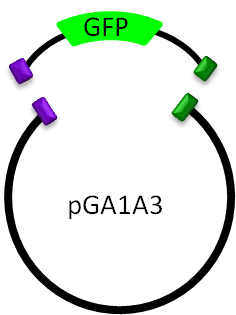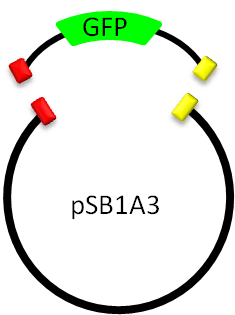Team:Washington/Protocols/pGA
From 2011.igem.org
(→Gibson reactions) |
|||
| (9 intermediate revisions not shown) | |||
| Line 1: | Line 1: | ||
{{Template:Team:Washington/Templates/Top}} | {{Template:Team:Washington/Templates/Top}} | ||
| + | __NOTOC__ | ||
| Line 6: | Line 7: | ||
=== PCR === | === PCR === | ||
| - | The PCR reactions were conducted with 2x Phusion Flash polymerase master mix, 1 ng plasmid template, and 0.5 μM of each primer. | + | The PCR reactions were conducted at 20 μL volumes with 2x Phusion Flash polymerase master mix, 1 ng plasmid template, and 0.5 μM of each primer. |
For the pGA assay, the insert came from a pGA1C3 vector and the insert came from a pGA1A3 vector expressing GFP. We used primers pGAprefix_fwd and pGAsuffix_rev to amplify the insert, and pGAsuffix_fwd and pGAprefix_rev to amplify the backbone. | For the pGA assay, the insert came from a pGA1C3 vector and the insert came from a pGA1A3 vector expressing GFP. We used primers pGAprefix_fwd and pGAsuffix_rev to amplify the insert, and pGAsuffix_fwd and pGAprefix_rev to amplify the backbone. | ||
| - | For the pSB assay, the insert came from a pSB3K3 vector and the insert came from a pSB1A3 vector expressing low GFP levels that are not strong enough to see visually. We used Biobrick primers [http://partsregistry.org/wiki/index.php?title=Part:BBa_G1004 BioBrick_f] and | + | For the pSB assay, the insert came from a pSB3K3 vector and the insert came from a pSB1A3 vector expressing low GFP levels that are not strong enough to see visually. We used pre-existing Biobrick primers [http://partsregistry.org/wiki/index.php?title=Part:BBa_G1004 BioBrick_f] and [http://partsregistry.org/wiki/index.php?title=Part:BBa_G1005 BioBrick_r] to amplify the insert and [http://partsregistry.org/wiki/index.php?title=Part:BBa_G1000 Suffix_f] and [http://partsregistry.org/wiki/index.php?title=Part:BBa_G1001 Prefix_r] to amplify the backbone. |
| + | <br/><br/><br/> | ||
=== Gibson reactions === | === Gibson reactions === | ||
| - | After performing PCR as outlined above, each fragment was run on a 1% agarose gel and gel-extracted using a Qiagen QIAquick gel extraction kit. 20 ng of gel-extracted insert and 20 ng of gel-extracted backbone were added to a 20 μL Gibson reaction which was set up on ice and incubated at 50 | + | After performing PCR as outlined above, each fragment was run on a 1% agarose gel and gel-extracted using a Qiagen QIAquick gel extraction kit. 20 ng of gel-extracted insert and 20 ng of gel-extracted backbone were added to a 20 μL Gibson reaction which was set up on ice and incubated at 50°C for one hour. |
| + | <br/><br/><br/> | ||
| + | ===pGA transformations=== | ||
[[File:Washington_iGEM2011_pGAprotocol.png|thumb|right|175px| pGA vector Assembly ]] | [[File:Washington_iGEM2011_pGAprotocol.png|thumb|right|175px| pGA vector Assembly ]] | ||
'''Note: Prepare these mixtures on ice''' | '''Note: Prepare these mixtures on ice''' | ||
| - | # | + | # Obtain a 40 uL aliquot of BL21 cells. |
| - | # | + | # Add 120 uL of ice water to the aliquot. |
| - | # | + | # The total volume is now 160 uL; split evenly among four labeled tubes: INS + BCK, INS + BCK, INSctrl, BCKctrl. |
| - | # | + | #* INS + BCK tubes (x 2) |
| - | #** add 1 uL of | + | #** add 1 uL of 10x-diluted pGA Gibson product (1A3 BCK/INS pLacGFP) |
| - | # | + | #* INSctrl tube |
| - | + | #** add 100 pg of pLacGFP gel extract | |
| - | + | #* BCKctrl | |
| - | + | #** add 100 pg of 1A3 gel extract | |
| - | <br/> | + | <br/><br/><br/><br/><br/><br/><br/> |
| + | |||
| + | ===pSB transformations=== | ||
Repeat the process for the comparison pSB vector as follows: | Repeat the process for the comparison pSB vector as follows: | ||
[[File:Washington_iGEM2011_pSBprotocol.png|thumb|right|175px| pSB vector Assembly ]] | [[File:Washington_iGEM2011_pSBprotocol.png|thumb|right|175px| pSB vector Assembly ]] | ||
Latest revision as of 21:59, 28 September 2011
Gibson assembly efficiency assay
PCR
The PCR reactions were conducted at 20 μL volumes with 2x Phusion Flash polymerase master mix, 1 ng plasmid template, and 0.5 μM of each primer.
For the pGA assay, the insert came from a pGA1C3 vector and the insert came from a pGA1A3 vector expressing GFP. We used primers pGAprefix_fwd and pGAsuffix_rev to amplify the insert, and pGAsuffix_fwd and pGAprefix_rev to amplify the backbone.
For the pSB assay, the insert came from a pSB3K3 vector and the insert came from a pSB1A3 vector expressing low GFP levels that are not strong enough to see visually. We used pre-existing Biobrick primers [http://partsregistry.org/wiki/index.php?title=Part:BBa_G1004 BioBrick_f] and [http://partsregistry.org/wiki/index.php?title=Part:BBa_G1005 BioBrick_r] to amplify the insert and [http://partsregistry.org/wiki/index.php?title=Part:BBa_G1000 Suffix_f] and [http://partsregistry.org/wiki/index.php?title=Part:BBa_G1001 Prefix_r] to amplify the backbone.
Gibson reactions
After performing PCR as outlined above, each fragment was run on a 1% agarose gel and gel-extracted using a Qiagen QIAquick gel extraction kit. 20 ng of gel-extracted insert and 20 ng of gel-extracted backbone were added to a 20 μL Gibson reaction which was set up on ice and incubated at 50°C for one hour.
pGA transformations
Note: Prepare these mixtures on ice
- Obtain a 40 uL aliquot of BL21 cells.
- Add 120 uL of ice water to the aliquot.
- The total volume is now 160 uL; split evenly among four labeled tubes: INS + BCK, INS + BCK, INSctrl, BCKctrl.
- INS + BCK tubes (x 2)
- add 1 uL of 10x-diluted pGA Gibson product (1A3 BCK/INS pLacGFP)
- INSctrl tube
- add 100 pg of pLacGFP gel extract
- BCKctrl
- add 100 pg of 1A3 gel extract
- INS + BCK tubes (x 2)
pSB transformations
Repeat the process for the comparison pSB vector as follows:
- 1 uL of pSB Gibson product (T19-1A3/pLacGFP)
- 1 ng INS (pLacGFP- gel extract)
- 1 ng BCK (T19-1A3- gel extract)
- Once all the samples are ready, begin the transformation.
- Rescue each sample in 500 mLs of LB
- Incubate all samples @ 37oC for ~45 min.
- Plate 50 uL on each sample onto a LB + Chlor + Amp + IPTG plate.
- 1 plate for each control in each vector set.
- 3 plates for each Gibson product tube in each set. ( 6 plates for each vector set + 2 control plates)
 "
"




